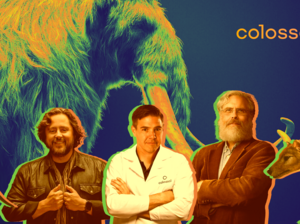
Welcome to The National Beat powered by American Inno, a weekly look at the startup fundings, profiles, analysis and other news you need to know from 40+ cities across the U.S. Want more stories like this in your inbox? Sign up for our future national newsletter from American Inno.
The Big One: Salesforce's Marc Benioff on quiet quitting
At Dreamforce, the annual company conference for Salesforce Inc. (NYSE: CRM), co-CEO Marc Benioff couldn't help but be a bit wistful about what the world has gone through — and how businesses and their workforces have been impacted, Bay Area Inno reporter Sara Bloomberg writes.
He addressed all of the workforce trends of the last couple years, right up to the idea of "quiet quitting," which splashed into mainstream discourse after the Wall Street Journal published an article about the trend in August.
"We've all come so far. It's now the Great Relocation. The Great Resignation, we saw. We saw the Great Reshuffling. The Rethinking. The Great Reimagination," Benioff said. "We saw a Great Renegotiation with ourselves, with our families. We saw a Great Negotiation with our employers. We kind of redecided — what are we going to do now that we've had time to look at our lives, our companies, our society?"
The Salesforce co-founder also weighed in on the debate around “quiet quitting” — the idea that workers are either doing the bare minimum or setting boundaries with their time. It's hardly a new idea, but it's a way to disconnect from modern day hustle culture and burnout.
During a press conference with reporters from around the world at the St. Regis Hotel, just around the corner from Moscone Center, Benioff framed quiet quitting and burnout as an aspect of a collective trauma response to the Covid era.
"Everyone is reassessing their lives. We're still going through it. It's not like some door closed and you had two years to reassess your life, and now if you didn't do it, it's too late," Benioff said. "We've gone through this mass trauma on a global scale, and now we're in recovery."
It's a bit like dealing with collective post-traumatic stress disorder, he said, and people should always think about what they want and what's important to them.
"People should do what makes them happy, and they should do less of what makes them unhappy," Benioff said. "Then they will be happier."
Read the full story in Bay Area Inno here.
Startups to watch
- Retail technology startup Swiftly is Seattle's latest unicorn. The company announced a $100 million Series C round this week, pushing its value to more than $1 billion. It offers brick-and-mortar grocers tools like loyalty programs and digital coupons to help drive more consumers into the store.
- Cameo, a Chicago startup that lets you buy shoutouts and other interactions with celebrities, was one of the earliest champions of remote work at the onset of the pandemic. Now, the $1 billion startup is reversing course by planting its flag in a new Chicago HQ. The company opened a new global headquarters this week in the city's River North neighborhood with a new 10,000-square-foot office.
- Anthym, a HR tech startup based in Phoenix, is a platform that helps teams bond by sharing more about their personal lives. The company, which has worked with teams at Zillow and Google, runs facilitated sharing exercises for colleagues to get to know each other and foster a better team environment. It's among the startup set to present at TechCrunch’s newly formatted Startup Battlefield next month.
- In the Bay Area, Pano AI is building an imaging systems to detect and prevent wildfires. The startup, which raised a $20 million Series A led by Initialized Capital, works with local governments, utilities and private land owners to install 360-degree cameras that use artificial intelligence to quickly detect a fire and alert local fire agencies.
- Boston-based Stackwell Capital has built a robo-investing app aimed at eliminating the racial wealth gap. The app aims to make investing easy by recommending and managing a portfolio based on user preferences. It also provides overviews of basic principles of investing, like the importance of a diverse portfolio, and content that speaks specifically to experiences shared by some in the Black community. The startup also has multiyear partnerships with several NBA and WNBA teams to build investment education through community engagement.
- Random Games, a new video game startup based in Boulder, raised $7.6 million in new funding. Led by gaming industry veterans Tony Harman and Wyeth Ridgway, the startup uses blockchain technology to make its assets available to players and other video game developers. Those players and developers can then use the characters, artwork and other assets to make their own games, comic books or other merchandise to sell.
- GiveCampus, a D.C. startup that helps public and private schools raise money, just raked in $50 million of its own. The startup's social fundraising platform provides crowdfunding and other campaigns, similar to Kickstarter or GoFundMe. It has supported more than $2 billion in giving for the more than 1,000 schools.
- L.A.-based JusticeText created a software platform that uses artificial intelligence to take the voluminous amount of video involved in many criminal cases and streamline it, expediting the video viewing process and giving defenders more time to build compelling cases with excerpts from the videos. The startup, which is used by public defenders, recently closed a $2.2 million seed round from backers like Reid Hoffman and John Legend.
- Farm equipment giant John Deere has led a $16 million funding round into InnerPlant, based in the Sacramento area, which has developed technology that allows plants to signal farmers optically about their condition. InnerPlant strains visually signal farmers when the plants need water, nutrients or protection from pests, by using filters coupled with satellite or drone images to show problems quickly in the field.
- SaaS Alerts, a Wilmington, North Carolina-based cybersecurity startup, recently hauled in $22 million in funding. Companies use SaaS Alert's real-time monitoring platform to protect against things like data theft and actions taken by bad actors.
Inside the deal: 'Maybe I can manage a CVS'
Kentucky startup Podchaser was recently acquired by Acast for more than $27 million. But the podcast database startup almost didn't make it to that point.
It took extreme persistence, luck and a little desperation to get early funding from backers like Poplar Ventures, a Louisville-based venture fund, CEO Bradley Davis told KY Inno.
"It's not giving up, even though you get told 'no' hundreds and hundreds of times ... It's not for the faint of heart," he said. "It's kind of cliche, but keeping going even though there were many, many times where I thought, 'This is impossible. What am I doing?'
"I'd be on Indeed, late at night, being like, 'Maybe I can manage a CVS.' I don't have any skills. My skills do not translate to the workforce. I don't know anything — I just know how to build a podcast company."
Sports stars ditch used car dealerships for startup deals, boosting local tech scenes
It's not every day that a startup decides to relocate from sunny Los Angeles to Green Bay, Wisconsin. But that's the story behind ChemDirect, an online chemical supply marketplace that moved from sunny LA to the frozen tundra after receiving an investment from TitletownTech, a $25 million VC fund from the Green Bay Packers and Microsoft.
The startup's relocation shows, in part, the impact of the Packers brand — but also the potential impact for local startup ecosystems when sports teams and their stars turn to venture capital investing.
Venture capital has, in many ways, replaced the used car dealership and restaurant ownership stake athletes once turned to when looking to invest their millions. And it has provided a major boost to startups not only through capital, but with the increased visibility and connections that come with partnering with sports stars.
Weird and Wired: Diagnosing disease through voice
University of South Florida Health is leading the way on a project that could help diagnose cancer and depression through the sound of a patient’s voice, according to Tampa Bay Inno.
The project, called “Voice as a Biomarker of Health,” is part of the NIH’s program focused on using AI to tackle biomedical problems. A database of voices will be ethically sourced and protected with patient privacy, according to officials. Machine learning models will be trained to spot diseases by detecting changes in the patients’ voices. It would be used in addition to other traditional clinical methods.









